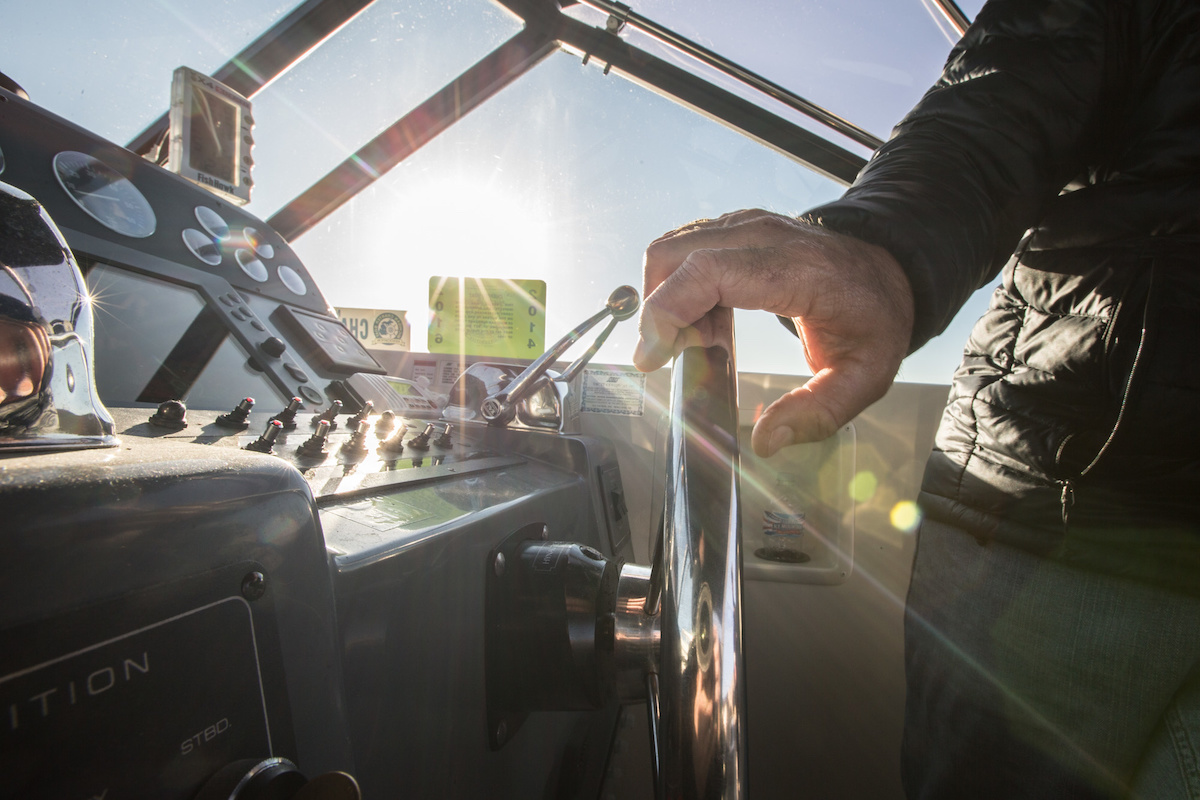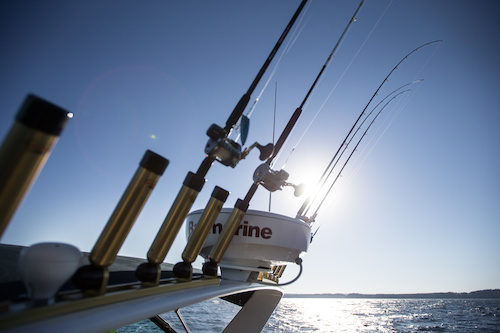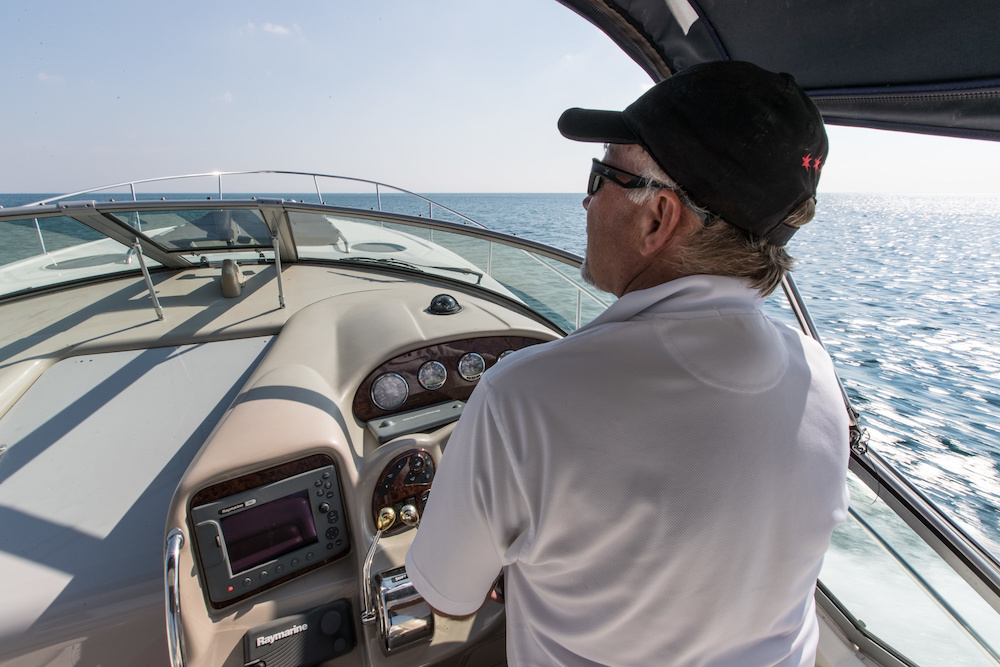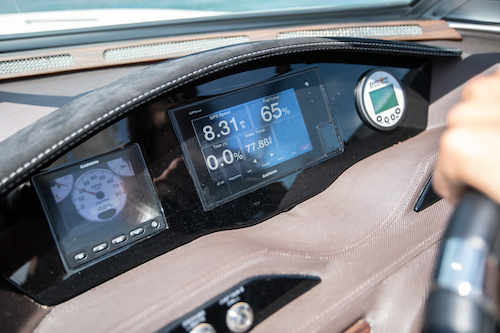GPS, or Global Positioning Systems, are satellite-based navigation systems developed by the U.S. Department of Defense for military purposes—but they're familiar to most of us as the navigational system used by our phones and cars. Whether you’re talking about the GPS on your phone, in your car, or a marine GPS for boats, all these units receive radio signals from multiple orbiting satellites to determine your position.
There are currently 30 active GPS satellites in orbit, plus some extras reserved as spares in case one or more satellites has mechanical difficulties or is damaged. By knowing the position of a minimum of three of these satellites, and calculating the time differences between the transmitted signals—which are moving through space at over 186,000 MPH—your GPS receiver can determine its exact position anywhere on earth.
Interested in Buying a Boat? Explore our Boat Finder
How to Use Marine GPS for Boating
The more satellite signals your GPS receives, the more accurately it can calculate that position, and while accuracy depends on a number of factors ranging from atmospheric conditions to receiver quality, when many multiple satellites are in view a common GPS receiver can typically put your position within a 16-foot radius. High-end receivers with dual channels can get significantly more accurate.
- Once underway, your GPS continually updates your position and provides speed and directional information.
- GPS also allows you to save positions, which we commonly call “waypoints.” For boaters, this can be helpful to permanently record the location of a channel, a shoal, or a fishing hot-spot.
- You can also string a number of waypoints together to create a route, taking you from point “A” to point “Z”.
Originally boating GPS units displayed your position in latitude and longitude, and while that information can still be displayed, on most modern marine GPS people use a digital chart to see where they are—much like you can look at a street map showing your position on your cell phone. A GPS that can display charts is called a “chartplotter” or “GPS/chartplotter.” And in recent years digital charts have become much more comprehensive in the areas they cover, have improved detail levels, and better accuracy. In fact, many modern chartplotters also allow you to improve the digital charts you look at in real-time as you operate your boat, by matching up your GPS position with depth soundings taken by your fishfinder.
Marine Navigation with GPS
Navigating with GPS is usually the most efficient, easiest way to navigate a boat, but far too many people use it as a graphical representation rather than a numeric one. You can display a digital chart on your GPS unit, and steer the boat in such a way that the boat icon at the center of the screen points in the correct general direction. But you’ll steer much more accurately if you instead use a dedicated “steering screen” that gives you the numeric compass heading you want to follow, the course you’re actually steering, and an arrow or indicator that tells you whether to steer to port or starboard to get back on the most direct course.
Be sure to read Marine Navigation: How to Navigate a Boat to get a more complete picture of navigating boats both with and without GPS. And remember: while most of us do depend on GPS to navigate our boats most of the time, no one should ever rely on it 100-percent. Like any electronic system GPS is subject to failure and you’ll need to know how to get back home when your electronics let you down.
Learn More: Marine Navigation: How to Navigate a Boat
Why You Need GPS on Your Boat
Even boaters who never leave sight of land should have a GPS/chartplotter aboard, on just about any boat. You never know when you’ll encounter fog, or a mechanical issue forces you to stay out late and navigate home in the darkness. And at times like those, you’ll be quite relieved you have GPS aboard. Plus, today’s units are so inexpensive (you can get a basic GPS/chartplotter for just a couple hundred dollars) that there’s really no excuse not to have one.
Wait a minute—your phone already has GPS, so why get another one just for your boat? That’s a good question, particularly because you can use a number of boating apps to more or less turn your phone into a mini-chartplotter. Cell phones, however, have a number of drawbacks:
- They aren’t always hearty enough to escape damage when spray starts flying or they fall off the dash and onto a fiberglass deck;
- They aren’t hard-mounted at the helm and few add-on mounts can take the vibration and impacts a running boat dishes out;
- Their batteries may run out faster than expected; and many boaters travel outside of cell coverage areas on a regular basis.
So while having a cell phone with a navigational app loaded up can come in handy and is a good back-up to have aboard, it should never be depended upon as your main navigational tool.
Other Uses for GPS on Boats
Anchor Alarm
A feature of GPS that’s useful to boaters in particular is the ability to set an “anchor alarm.” You can establish a geofence around your boat while it’s at anchor, and if the anchor drags or the line comes loose and your boat goes through the geofence, your GPS will sound an alarm.
Security System
Some of today’s systems also allow you to interface with your boat’s GPS from afar, via an app on your cell phone, so it acts as a security system. You can set that geofence up around your boat, and if someone tries to steal it, you’ll get a text alarm as soon as it moves out of position.
Additional Features
If your GPS is “networked” (wired to the other electronics aboard the boat) it can also fulfill a number of additional functions.
- It can let the autopilot know where to steer, overlay additional data (like boat radar) over the digital charts.
- Perhaps most importantly, give your VHF radio the boat’s position data. When your VHF receives position data you can use it for DSC (digital selective calling). Do so, and if you ever have to call the Coast Guard they will receive your exact position data via the radio transmission. This is a potentially life-saving feature, so be sure to take a closer look at VHF communications and DSC by reading How to Use a VHF Radio.
To learn more about GPS and see the government’s official statements about it, read FAQs, and more, visit the official U.S. Government GPS website.
Read Next: 5 Best Marine Navigation Apps for Boaters
You Might Also Like:



